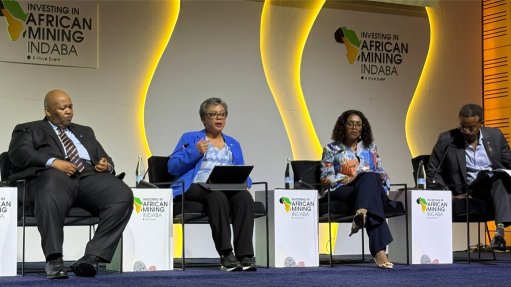Opinion: Africa’s trade evolution in 2025 – from tariff turbulence to continental ambition
In this article, law firm Bowmans partner Xolani Nyali writes that Africa's role in global trade is changing and that it is important to see how the benefits of this are distributed within the continent.
As global supply chains fragmented under the weight of US tariffs and economic blocs hardened in 2025, the continent has had to navigate an emerging multipolarity. In particular, the recent expiry of the African Growth and Opportunity Act (AGOA) with the US and the promising start of trade under the African Continental Free Trade Area (AfCFTA) have motivated African policymakers, exporters and investors to reassess a future for African trade that is no longer dominated by unilateral preferences, while simultaneously working to repair still-important relationships.
AGOA
AGOA officially lapsed on September 30, leaving the future of African trade with the US uncertain. Yet, a glimmer of hope has come in the form of reported consensus among US and African stakeholders that AGOA could be extended for at least two more years.
According to global think tank the Carnegie Endowment for International Peace, while the US White House signalled support for the short-term continuation of AGOA and key members of the US Congress had introduced renewal bills, the October 2025 government shutdown temporarily froze the momentum.
On 25 November 2025, it was further revealed that one of these new bills introduced into the US Senate explicitly excludes South Africa from potential AGOA renewal. If passed, the AGOA Extension and Bilateral Engagement Act would extend the AGOA programme for two years. It would also incorporate the US-South Africa Bilateral Relations Review Act, which would trigger a review of South Africa’s participation in AGOA.
While it might take more time than expected to renew the US-Africa preferential trade agreement, its short-term renewal would allow the US some space to finalise the negotiation of bilateral trade agreements with key African countries. It would also be of immense support to African exporters who are currently on a cliff edge in terms of their exports to the US.
In a move that offered relief to African exporters, on 14 November 2025, the US White House announced tariff exemptions on more than 100 agricultural products, including coffee, cocoa, vanilla beans, high-quality beef cuts, and a wide range of fruits, spices and nuts. This will particularly benefit exporters in East and West Africa who are heavily reliant on agricultural trade to the US.
While the US exemptions may soften the blow for some exporters, they do not address broader trade uncertainty, especially around AGOA. The lapse of AGOA has already triggered a return to Most Favoured Nation (MFN) tariffs, with some products from South African exporters facing combined duties exceeding 30%, for example. The exclusions also do not extend to all products, including South Africa’s strategic wine and automotive components, which remain on the US tariff list.
In August this year, the Minister of Trade, Industry and Competition in South Africa, in consultation with the Competition Commission, issued the Draft Block Exemption for the Promotion of Exports (Regulations) to assist South African businesses exporting goods and services to work together to mitigate the economic impact of increased trade tariffs by the US. However, the exemptions have seemingly been quietly shelved as the country focuses on building, repairing and evolving its trade relationships.
The short-term AGOA renewal would clearly provide immediate relief, but the setting up of new, reciprocal trade frameworks with the world’s major trade players is also essential.
In this regard, AGOA’s expiry has presented an opportunity for African countries to revise their trade strategies with the US. For example, Kenya is currently looking at deals that attract US investment in its electric vehicle, pharmaceutical and textile value chains, with the country positioning itself as a hub for future-facing trade alliances. In South Africa, despite tensions between the two countries over the near absence of the US from the G20 and a possible exclusion from AGOA, the country’s trade envoys insist that negotiations to restore the bilateral trade relationship are progressing.
AfCFTA
Further, the regional free trade opportunities on offer under AfCFTA have begun to reveal a longer-term pathway towards more robust intra-African trade. The increased level of strategic investments in infrastructure to facilitate cross-border trade, storage and movement of goods, suggests building momentum around AfCFTA. This is being done either directly by governments or through public-private partnerships as a key enabler, complemented by a focus on diversifying imports from raw material exports (which most African economies produce and so, demand less of) to value-added production.
This is particularly the case for critical minerals, where local processing facilities powered by renewable energy are already in progress in South Africa, Zimbabwe and Namibia, for example. Given Africa’s recent experience with Covid-19 vaccines, a similar initiative relating to integrated African pharmaceutical supply chains is being discussed. Sector-led initiatives are likely to be the building blocks of robust and resilient trade under AfCFTA.
G20
Trade and investment were also key focus areas of the G20 Summit, which took place in South Africa in November 2025. The Summit’s trade agenda focused on, among other things, inclusive growth, trade diversification and the development of more resilient supply chains.
Africa’s approach to trade is aligned with that of the G20. The G20’s focus on green industrialisation and regional resilience closely mirrors the agenda of AfCFTA through its Protocols on Trade in Goods, Services and Investment, which aim to reduce tariff and non-tariff barriers, harmonise standards and unlock regional networks. The AfCFTA Protocol on Women and Youth in Trade, for example, is also similar to the G20’s commitment to inclusive economic participation.
Through the African Union, African nations leveraged the global G20 platform to highlight the urgent need for more inclusive trade and investment on fairer terms. Given the need for vast hard and soft trade facilitation infrastructure investments on the continent, it was not by chance that discussions at the G20 also focused on fairer debt financing frameworks for African countries as mechanisms for crowding in private sector investment.
That the development of infrastructure and supply chains to support African trade must be sustainable is not in question. The outcomes of the G20 Summit and the aims of AfCFTA are notably aligned in this regard, and policymakers ought to be applauded for this achievement.
FINAL NOTE
What is clear from these developments in 2025 is that Africa’s role in global trade is changing. The continent is now a co-architect of a more equitable, sustainable and resilient global trading system. As the implementation of AfCFTA takes root and accelerates, this role will only be cemented. Key to watch for is how the benefits of this new order are distributed within the continent so as to maintain confidence and buy-in into the system.
Article Enquiry
Email Article
Save Article
Feedback
To advertise email advertising@creamermedia.co.za or click here
Press Office
Announcements
What's On
Subscribe to improve your user experience...
Option 1 (equivalent of R125 a month):
Receive a weekly copy of Creamer Media's Engineering News & Mining Weekly magazine
(print copy for those in South Africa and e-magazine for those outside of South Africa)
Receive daily email newsletters
Access to full search results
Access archive of magazine back copies
Access to Projects in Progress
Access to ONE Research Report of your choice in PDF format
Option 2 (equivalent of R375 a month):
All benefits from Option 1
PLUS
Access to Creamer Media's Research Channel Africa for ALL Research Reports, in PDF format, on various industrial and mining sectors
including Electricity; Water; Energy Transition; Hydrogen; Roads, Rail and Ports; Coal; Gold; Platinum; Battery Metals; etc.
Already a subscriber?
Forgotten your password?
Receive weekly copy of Creamer Media's Engineering News & Mining Weekly magazine (print copy for those in South Africa and e-magazine for those outside of South Africa)
➕
Recieve daily email newsletters
➕
Access to full search results
➕
Access archive of magazine back copies
➕
Access to Projects in Progress
➕
Access to ONE Research Report of your choice in PDF format
RESEARCH CHANNEL AFRICA
R4500 (equivalent of R375 a month)
SUBSCRIBEAll benefits from Option 1
➕
Access to Creamer Media's Research Channel Africa for ALL Research Reports on various industrial and mining sectors, in PDF format, including on:
Electricity
➕
Water
➕
Energy Transition
➕
Hydrogen
➕
Roads, Rail and Ports
➕
Coal
➕
Gold
➕
Platinum
➕
Battery Metals
➕
etc.
Receive all benefits from Option 1 or Option 2 delivered to numerous people at your company
➕
Multiple User names and Passwords for simultaneous log-ins
➕
Intranet integration access to all in your organisation





















